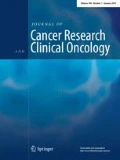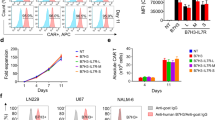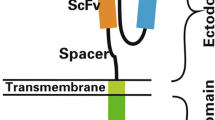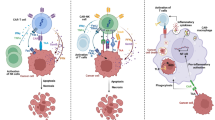Abstract
Purpose
Melanoma antigen gene A3 (MAGE-A3) is aberrantly expressed in a number of cancer types. Because of its high specificity, MAGE-A3 has shown to be a promising candidate for cancer immunotherapy. Dendritic cells (DCs) have emerged as the natural agents for antigen delivery. DCs transduced with antigen may increase immune response and maintain immune durability. The aim of this study was to investigate the roles of DCs transduced with lentiviral vectors (LVs) encoding full-length MAGE-A3 gene in cancer immunotherapy .
Methods
A LV containing full-length MAGE-A3 gene (rLV/MAGE-A3) was constructed. Reverse transcriptase-polymerase chain reaction and direct DNA sequencing were performed to verify the construct. Human DCs derived from umbilical cord blood were then transduced with rLV/MAGE-A3. The potency of rLV/MAGE-A3-transduced DCs was examined by measurement of surface markers and mixed lymphocyte reaction. The MAGE-A3-specific T-cell response induced by DCs was detected using the lactate dehydrogenase release assay.
Results
rLV/MAGE-A3 was constructed successfully and used to transduce DCs efficiently. DCs transduced with rLV/MAGE-A3 stably expressed MAGE-A3 and yielded high percentage of cells expressing CD80, CD86, and HLA-DR. rLV/MAGE-A3 transduction did not impair DCs viability and maturation at a multiplicity of infection of 30. The rLV/MAGE-A3-transduced DCs induced MAGE-A3-specific T lymphocytes that exhibited a significant lysis activity against MAGE-A3-bearing tumor cell lines (HuH-7 and SGC-7901).
Conclusions
DC-directed rLV/MAGE-A3 efficiently induced antigen-specific immune responses, indicating the possibility of DC-based MAGE-A3 antigen vaccine as a promising strategy for treatment of MAGE-A3-associated cancer.





Similar content being viewed by others
References
Adotevi O, Mollier K, Neuveut C, Dosset M, Ravel P, Fridman WH, Tartour E, Charneau P, Wain-Hobson S, Langlade-Demoyen P (2010) Targeting human telomerase reverse transcriptase with recombinant lentivector is highly effective to stimulate antitumor CD8 T-cell immunity in vivo. Blood 115(15):3025–3032
Arce F, Breckpot K, Collins M, Escors D (2011) Targeting lentiviral vectors for cancer immunotherapy. Curr Cancer Ther Rev 7(4):248–260
Atanackovic D, Arfsten J, Cao Y, Gnjatic S, Schnieders F, Bartels K, Schilling G, Faltz C, Wolschke C, Dierlamm J, Ritter G, Eiermann T, Hossfeld DK, Zander AR, Jungbluth AA, Old LJ, Bokemeyer C, Kroger N (2007) Cancer-testis antigens are commonly expressed in multiple myeloma and induce systemic immunity following allogeneic stem cell transplantation. Blood 109(3):1103–1112
Bellati F, Napoletano C, Tarquini E, Palaia I, Landi R, Manci N, Spagnoli G, Rughetti A, Panici PB, Nuti M (2007) Cancer testis antigen expression in primary and recurrent vulvar cancer: association with prognostic factors. Eur J Cancer 43(17):2621–2627
Bhargava A, Mishra D, Banerjee S, Mishra PK (2012) Dendritic cell engineering for tumor immunotherapy: from biology to clinical translation. Immunotherapy 4(7):703–718
Boudreau JE, Bonehill A, Thielemans K, Wan Y (2011) Engineering dendritic cells to enhance cancer immunotherapy. Mol Ther 19(5):841–853
Carrasco J, Van Pel A, Neyns B, Lethe B, Brasseur F, Renkvist N, van der Bruggen P, van Baren N, Paulus R, Thielemans K, Boon T, Godelaine D (2008) Vaccination of a melanoma patient with mature dendritic cells pulsed with MAGE-3 peptides triggers the activity of nonvaccine anti-tumor cells. J Immunol 180(5):3585–3593
Cui J, Lin AL, Liu Q, Sun Q, Gao ZH (2010) Dendritic cells transfected with lentiviral vector-encoding human granulocyte-macrophage colony-stimulating factor augment anti-tumour T-cell response in vitro. Int J Immunogenet 37(5):329–336
Dasgupta A, McCarty D, Spencer HT (2010) Engineered drug-resistant immunocompetent cells enhance tumor cell killing during a chemotherapy challenge. Biochem Biophys Res Commun 391(1):170–175
Decker T, Lohmann-Matthes ML (1988) A quick and simple method for the quantitation of lactate dehydrogenase release in measurements of cellular cytotoxicity and tumor necrosis factor (TNF) activity. J Immunol Methods 115(1):61–69
Hemminger JA, Ewart Toland A, Scharschmidt TJ, Mayerson JL, Kraybill WG, Guttridge DC, Iwenofu OH (2013) The cancer-testis antigen NY-ESO-1 is highly expressed in myxoid and round cell subset of liposarcomas. Mod Pathol 26(2):282–288
Hu B, Dai B, Wang P (2010) Vaccines delivered by integration-deficient lentiviral vectors targeting dendritic cells induces strong antigen-specific immunity. Vaccine 28(41):6675–6683
Hussein YM, Ghareib AF, Mohamed RH, Radwan MI, Elsawy WH (2012) MAGE-3 and MAGE-4 genes as possible markers for early detection of metastases in hepatitis C virus Egyptian patients complicated by hepatocellular carcinoma. Med Oncol 29(2):994–999
Jung EJ, Kim MA, Lee HS, Yang HK, Lee YM, Lee BL, Kim WH (2005) Expression of family a melanoma antigen in human gastric carcinoma. Anticancer Res 25(3B):2105–2111
Kealy B, Liew A, McMahon JM, Ritter T, O’Doherty A, Hoare M, Greiser U, Vaughan EE, Maenz M, O’Shea C, Barry F, O’Brien T (2009) Comparison of viral and nonviral vectors for gene transfer to human endothelial progenitor cells. Tissue Eng Part C Methods 15(2):223–231
Korzeniewski C, Callewaert DM (1983) An enzyme-release assay for natural cytotoxicity. J Immunol Methods 64(3):313–320
Kruit WH, Suciu S, Dreno B, Mortier L, Robert C, Chiarion-Sileni V, Maio M, Testori A, Dorval T, Grob JJ, Becker JC, Spatz A, Eggermont AM, Louahed J, Lehmann FF, Brichard VG, Keilholz U (2013) Selection of immunostimulant AS15 for active immunization with MAGE-A3 protein: results of a randomized phase II study of the European Organisation for Research and Treatment of Cancer Melanoma Group in Metastatic Melanoma. J Clin Oncol 31(19):2413–2420
Li M, Yuan YH, Han Y, Liu YX, Yan L, Wang Y, Gu J (2005) Expression profile of cancer-testis genes in 121 human colorectal cancer tissue and adjacent normal tissue. Clin Cancer Res 11(5):1809–1814
Li DY, Gu C, Min J, Chu ZH, Ou QJ (2012) Maturation induction of human peripheral blood mononuclear cell-derived dendritic cells. Exp Ther Med 4(1):131–134
Lois C, Hong EJ, Pease S, Brown EJ, Baltimore D (2002) Germline transmission and tissue-specific expression of transgenes delivered by lentiviral vectors. Science 295(5556):868–872
Melloni G, Ferreri AJ, Russo V, Gattinoni L, Arrigoni G, Ceresoli GL, Zannini P, Traversari C (2004) Prognostic significance of cancer-testis gene expression in resected non-small cell lung cancer patients. Oncol Rep 12(1):145–151
Mortarini R, Anichini A, Di Nicola M, Siena S, Bregni M, Belli F, Molla A, Gianni AM, Parmiani G (1997) Autologous dendritic cells derived from CD34+ progenitors and from monocytes are not functionally equivalent antigen-presenting cells in the induction of melan-A/Mart-1(27-35)-specific CTLs from peripheral blood lymphocytes of melanoma patients with low frequency of CTL precursors. Cancer Res 57(24):5534–5541
Negri DR, Michelini Z, Bona R, Blasi M, Filati P, Leone P, Rossi A, Franco M, Cara A (2011) Integrase-defective lentiviral-vector-based vaccine: a new vector for induction of T cell immunity. Expert Opin Biol Ther 11(6):739–750
Ohman Forslund K, Nordqvist K (2001) The melanoma antigen genes—any clues to their functions in normal tissues? Exp Cell Res 265(2):185–194
Oshita C, Takikawa M, Kume A, Miyata H, Ashizawa T, Iizuka A, Kiyohara Y, Yoshikawa S, Tanosaki R, Yamazaki N, Yamamoto A, Takesako K, Yamaguchi K, Akiyama Y (2012) Dendritic cell-based vaccination in metastatic melanoma patients: phase II clinical trial. Oncol Rep 28(4):1131–1138
Peled N, Oton AB, Hirsch FR, Bunn P (2009) MAGE A3 antigen-specific cancer immunotherapeutic. Immunotherapy 1(1):19–25
Peng JR, Chen HS, Mou DC, Cao J, Cong X, Qin LL, Wei L, Leng XS, Wang Y, Chen WF (2005) Expression of cancer/testis (CT) antigens in Chinese hepatocellular carcinoma and its correlation with clinical parameters. Cancer Lett 219(2):223–232
Pincha M, Sundarasetty BS, Salguero G, Gutzmer R, Garritsen H, Macke L, Schneider A, Lenz D, Figueiredo C, Blasczyk R, Ruggiero E, Schmidt M, von Kalle C, Puff C, Modlich U, von der Leyen H, Wicke DC, Ganser A, Stripecke R (2012) Identity, potency, in vivo viability, and scaling up production of lentiviral vector-induced dendritic cells for melanoma immunotherapy. Hum Gene Ther Methods 23(1):38–55
Rossetti M, Cavarelli M, Gregori S, Scarlatti G (2013) HIV-derived vectors for gene therapy targeting dendritic cells. Adv Exp Med Biol 762:239–261
Rossi M, Young JW (2005) Human dendritic cells: potent antigen-presenting cells at the crossroads of innate and adaptive immunity. J Immunol 175(3):1373–1381
Russo V, Pilla L, Lunghi F, Crocchiolo R, Greco R, Ciceri F, Maggioni D, Fontana R, Mukenge S, Rivoltini L, Rigamonti G, Mercuri SR, Nicoletti R, Maschio AD, Gianolli L, Fazio F, Marchiano A, Florio AD, Maio M, Salomoni M, Gallo-Stampino C, Fiacco MD, Lambiase A, Coulie PG, Patuzzo R, Parmiani G, Traversari C, Bordignon C, Santinami M, Bregni M (2013) Clinical and immunologic responses in melanoma patients vaccinated with MAGE-A3-genetically modified lymphocytes. Int J Cancer 132(11):2557–2566
Scanlan MJ, Gure AO, Jungbluth AA, Old LJ, Chen YT (2002) Cancer/testis antigens: an expanding family of targets for cancer immunotherapy. Immunol Rev 188:22–32
Tanaka FHN, Isikawa K, Inoue H, Mori M (2008) Potential role of dendritic cell vaccination with MAGE peptides in gastrointestinal carcinomas. Oncol Rep 20(25):1111–1116
Tsuji T, Altorki NK, Ritter G, Old LJ, Gnjatic S (2009) Characterization of preexisting MAGE-A3-specific CD4+ T cells in cancer patients and healthy individuals and their activation by protein vaccination. J Immunol 183(7):4800–4808
van der Bruggen P, Traversari C, Chomez P, Lurquin C, De Plaen E, Van den Eynde B, Knuth A, Boon T (1991) A gene encoding an antigen recognized by cytolytic T lymphocytes on a human melanoma. Science 254(5038):1643–1647
Vogel TU, Visan L, Ljutic B, Gajewska B, Caterini J, Salha D, Wen T, He L, Parrington M, Cao SX, McNeil B, Sandhu D, Scollard N, Zhang L, Bradley B, Tang M, Lovitt C, Oomen R, Dunn P, Tartaglia J, Berinstein NL (2010) Preclinical qualification of a new multi-antigen candidate vaccine for metastatic melanoma. J Immunother 33(8):743–758
Voskens CJ, Sewell D, Hertzano R, DeSanto J, Rollins S, Lee M, Taylor R, Wolf J, Suntharalingam M, Gastman B, Papadimitriou JC, Lu C, Tan M, Morales R, Cullen K, Celis E, Mann D, Strome SE (2012) Induction of mage-A3 and HPV-16 immunity by Trojan vaccines in patients with head and neck carcinoma. Head Neck 34(12):1734–1746
Wilgenhof S, Van Nuffel AM, Corthals J, Heirman C, Tuyaerts S, Benteyn D, De Coninck A, Van Riet I, Verfaillie G, Vandeloo J, Bonehill A, Thielemans K, Neyns B (2011) Therapeutic vaccination with an autologous mRNA electroporated dendritic cell vaccine in patients with advanced melanoma. J Immunother 34(5):448–456
Wojas-Krawczyk K, Krawczyk P, Buczkowski J, Walkowska A, Jankowska O, Czekajska-Chehab E, Milanowski J (2012) Immunotherapy of lung adenocarcinoma patient with Peptide-pulsed dendritic cells: a case report. Arch Immunol Ther Exp (Warsz) 60(1):69–77
Xiao L, Kim J, Lim M, Dai B, Yang L, Reed SG, Baltimore D, Wang P (2012) A TLR4 agonist synergizes with dendritic cell-directed lentiviral vectors for inducing antigen-specific immune responses. Vaccine 30(15):2570–2581
Xie LH, Sin FW, Cheng SC, Cheung YK, Chan KT, Xie Y (2008) Activation of cytotoxic T lymphocytes against CML28-bearing tumors by dendritic cells transduced with a recombinant adeno-associated virus encoding the CML28 gene. Cancer Immunol Immunother 57(7):1029–1038
Acknowledgments
The authors thank Mrs. Meiqin Gao for her excellent technical assistance. This research was supported by the grant of Natural Science Foundation of Fujian Province (C0610023, 2012J01362) and Fujian Medical University Fund (09ZD007).
Conflict of interest
We declare that we have no financial and personal relationships with other people or organizations that can inappropriately influence our work, there is no professional or other personal interest of any nature or kind in any product, service and/or company that could be construed as influencing the position presented in, or the review of, the manuscript entitled “Induction of antigen-specific immune responses by dendritic cells transduced with a recombinant lentiviral vector encoding MAGE-A3 gene”.
Author information
Authors and Affiliations
Corresponding author
Additional information
Liyan Lin and Juanbing Wei have contributed equally to this work and should be considered co-first authors.
Rights and permissions
About this article
Cite this article
Lin, L., Wei, J., Chen, Y. et al. Induction of antigen-specific immune responses by dendritic cells transduced with a recombinant lentiviral vector encoding MAGE-A3 gene. J Cancer Res Clin Oncol 140, 281–289 (2014). https://doi.org/10.1007/s00432-013-1552-8
Received:
Accepted:
Published:
Issue Date:
DOI: https://doi.org/10.1007/s00432-013-1552-8




